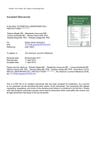 38 citations,
December 2009 in “Therapeutic Advances in Medical Oncology”
38 citations,
December 2009 in “Therapeutic Advances in Medical Oncology” The conclusion suggests that prostate cancer should be classified by castration status and that new therapies targeting androgen receptor signaling show promise.
 20 citations,
June 2010 in “Genes and Immunity”
20 citations,
June 2010 in “Genes and Immunity” Blood tests can help understand the genetic differences in people with alopecia areata, including how severe it is and if it's inherited.
 19 citations,
October 2018 in “Medicine”
19 citations,
October 2018 in “Medicine” Oriental herbal medicine with moxibustion may improve pregnancy rates and other symptoms in PCOS, but more high-quality research is needed.
 12 citations,
June 2023 in “JAMA network open”
12 citations,
June 2023 in “JAMA network open” JAK inhibitors effectively improve hair regrowth in alopecia areata with an acceptable safety profile.
 11 citations,
November 2012 in “Seminars in Cutaneous Medicine and Surgery”
11 citations,
November 2012 in “Seminars in Cutaneous Medicine and Surgery” Genetic factors affect hair loss, and molecular testing may help predict, diagnose, and treat it.
 3 citations,
May 2018 in “The American Journal of Medicine”
3 citations,
May 2018 in “The American Journal of Medicine” A woman's long-term scalp issues were diagnosed as a rare skin disorder called cutaneous Langerhans cell histiocytosis.
 3 citations,
May 1990 in “Journal of Steroid Biochemistry”
3 citations,
May 1990 in “Journal of Steroid Biochemistry” Some women with excess hair growth have a hormone condition that can't be diagnosed by blood or urine tests alone.
 1 citations,
March 2021 in “Dermatological reviews”
1 citations,
March 2021 in “Dermatological reviews” AGA, a common hair loss, is caused by genetics, hormones, age, and environmental factors.
 March 2024 in “Research Square (Research Square)”
March 2024 in “Research Square (Research Square)” Combining genetic and physical trait analysis improves diagnosis accuracy for monogenic diabetes.
 198 citations,
July 2011 in “Cochrane library”
198 citations,
July 2011 in “Cochrane library” Lifestyle changes can improve body composition, excess male hormone levels, and insulin resistance in women with PCOS.
 178 citations,
April 2017 in “Journal of The American Academy of Dermatology”
178 citations,
April 2017 in “Journal of The American Academy of Dermatology” Minoxidil, finasteride, and low-level laser light therapy effectively treat hair loss.
 70 citations,
April 2013 in “Endocrine”
70 citations,
April 2013 in “Endocrine” Lifestyle changes improve metabolism and fertility in overweight PCOS patients; anti-obesity drugs show potential but need more research.
 40 citations,
October 2012 in “British Journal of Dermatology”
40 citations,
October 2012 in “British Journal of Dermatology” Minoxidil helps regrow hair in female pattern hair loss, but more research needed for other treatments.
 13 citations,
March 2017 in “Genomics”
13 citations,
March 2017 in “Genomics” Genomic approach finds new possible treatments for hair loss.
 11 citations,
February 2021 in “Biomedicines”
11 citations,
February 2021 in “Biomedicines” Bacteria in our hair can affect its health and growth, and studying these bacteria could help us understand hair diseases better.
 2 citations,
January 2019
2 citations,
January 2019 The document concludes that autoimmune skin disorders are treated with corticosteroids and immunosuppressive drugs.
 2 citations,
July 2015 in “Archives of Dermatological Research”
2 citations,
July 2015 in “Archives of Dermatological Research” A new gene variant in the DSP gene is linked to a unique type of hair loss.
 April 2023 in “Medizinische Genetik”
April 2023 in “Medizinische Genetik” New research has found 14 genes linked to the risk of developing alopecia areata, improving understanding and treatment options.
 November 2022 in “CARDIOMETRY”
November 2022 in “CARDIOMETRY” A group has developed therapies that show promise for treating cancer and various other conditions.
 April 2018 in “bioRxiv (Cold Spring Harbor Laboratory)”
April 2018 in “bioRxiv (Cold Spring Harbor Laboratory)” A gene variant causes patched hair loss in mice, similar to alopecia areata in humans.

Any medication can cause skin reactions, some due to allergies and others due to dosage or genetic factors.
 October 2011 in “Journal of dermatology”
October 2011 in “Journal of dermatology” A man with a rare skin condition and a new gene mutation developed high calcium levels due to his treatment.
 September 2009 in “Pediatric Dermatology”
September 2009 in “Pediatric Dermatology” UVB is good for a skin condition in Asian kids, a lotion works for head lice, a drug helps with a skin blistering disorder, a foam reduces itchiness in skin inflammation, birthmarks can be more widespread, and criteria for a neurocutaneous disorder were agreed upon.
 65 citations,
January 2013 in “Cochrane library”
65 citations,
January 2013 in “Cochrane library” Some systemic treatments work for nail psoriasis but can have serious side effects.
 53 citations,
December 2015 in “JAMA Dermatology”
53 citations,
December 2015 in “JAMA Dermatology” Women with PCOS often have more body hair, acne, and skin darkening, and these signs are linked to metabolic issues like insulin resistance and high cholesterol.
 28 citations,
March 2014 in “International Journal of Nanomedicine”
28 citations,
March 2014 in “International Journal of Nanomedicine” New lipid nanoparticles show promise for delivering hair loss treatments but need improvement for better skin penetration.
 22 citations,
August 2015 in “Cochrane Database of Systematic Reviews”
22 citations,
August 2015 in “Cochrane Database of Systematic Reviews” The study aims to find the best treatment for central serous chorioretinopathy by comparing various options.
 21 citations,
May 2016 in “The Cochrane library”
21 citations,
May 2016 in “The Cochrane library” Topical minoxidil helps treat female pattern hair loss, but more research needed for other treatments.
 20 citations,
January 2013 in “Cell & Bioscience”
20 citations,
January 2013 in “Cell & Bioscience” Understanding how epigenetic regulation affects stem cells is key to cancer insights and new treatments.
 19 citations,
January 2018 in “Scientific Reports”
19 citations,
January 2018 in “Scientific Reports” Non-immune factors play a significant role in alopecia areata.






























